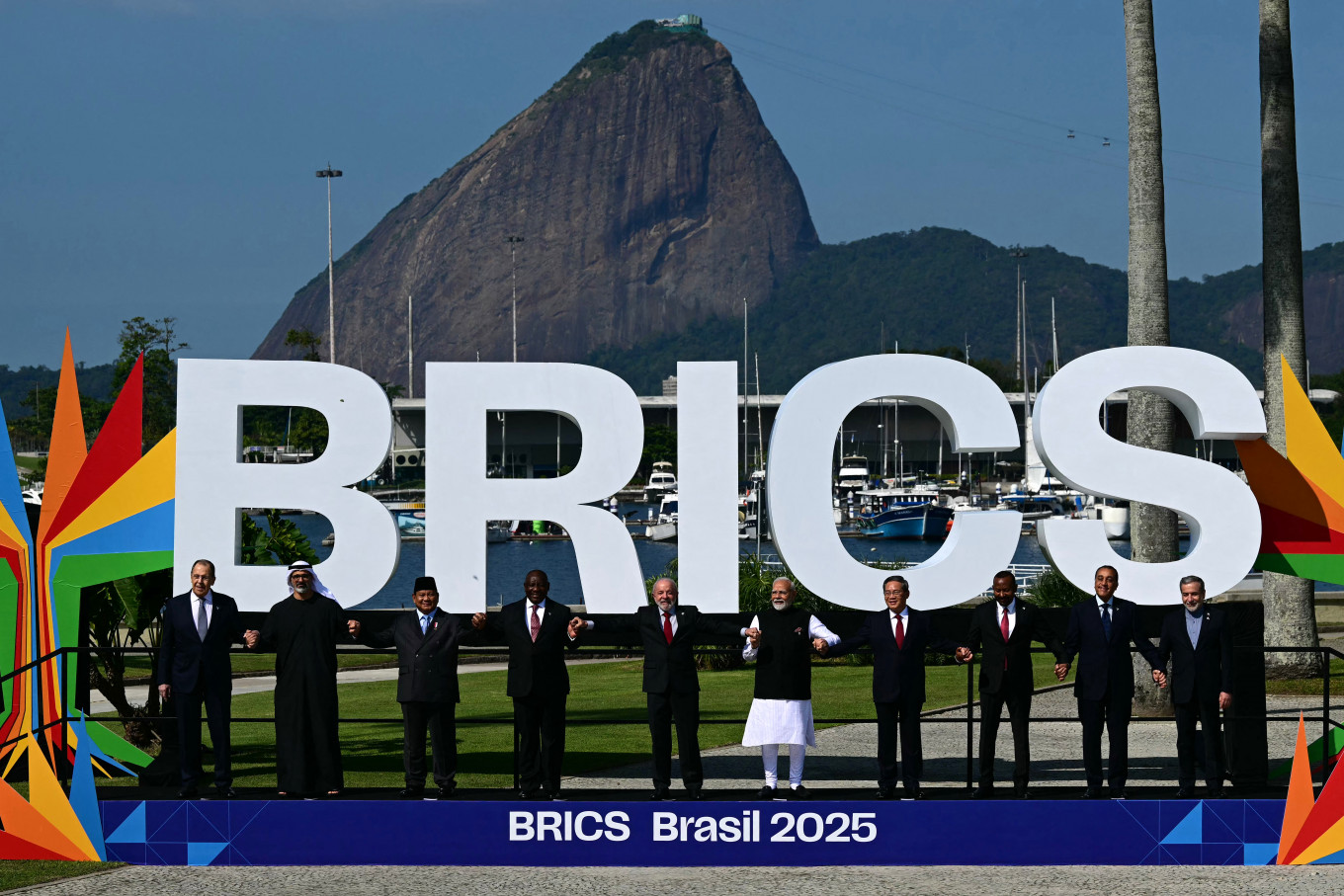Popular Reads
Top Results
Can't find what you're looking for?
View all search resultsPopular Reads
Top Results
Can't find what you're looking for?
View all search resultsSoutheast Asia and the BRICS expansion
The latest BRICS summit embodied the ongoing shift in the world order from one of Western domination in rules and narratives to one counterweighted by Global South nations wielding agency.
Change text size
Gift Premium Articles
to Anyone
I
n geopolitics, symbolism and substance often march hand in hand. The recent BRICS summit in Brazil is a case in point. While Western media largely reduced the event to a footnote, dismissing it as just another gathering of emerging economies, the joint declaration issued by the bloc signals something far more profound: the slow but undeniable erosion of Western hegemony and the ascent of a multipolar world order.
The BRICS declaration underscores what is increasingly self-evident: Multipolarity is no longer an aspiration; it is a geopolitical fact.
For decades, the world has operated under a system shaped by the neoliberal values of the so-called Washington Consensus, a system that has too often served as a thin veil for neocolonial exploitation. That consensus is fracturing today, and BRICS (Brazil, Russia, India, China, South Africa), which is now expanding to include new members like Indonesia, is emerging as one of the architects of this change.
One of the most striking features of the BRICS declaration is its unequivocal support for Palestinian statehood based on the 1967 borders, with East Jerusalem as the capital. The bloc has called for an immediate and unconditional ceasefire in Gaza, the withdrawal of Israeli forces, the release of hostages and the unhindered delivery of humanitarian aid. It is a position that flies in the face of Western double standards.
The contrast is instructive. When Russia invaded Ukraine, the West was quick to mobilize outrage, sanctions and military aid, yet when Israel's bombardment of Gaza results in mass civilian casualties, the Western response is often muted, mealy-mouthed or altogether absent.
BRICS has rightly pointed out this hypocrisy, calling for adherence to international law and the dignity of all people, regardless of political alliances.
This is not mere rhetoric. The call for Palestinian self-determination harks back to the spirit of the Bandung Conference in 1955, where postcolonial nations gathered to assert their right to chart their own course, free from imperial domination. In this regard, BRICS is not creating a new path but reviving an old one; one the world sorely needs to revisit.
Equally significant was the bloc’s condemnation of United States protectionism and unilateral economic measures that bypass the United Nations and undermine global stability. By denouncing tariffs, nontariff barriers and so-called green protectionism, the BRICS has shined a spotlight on the selective application of rules that have long skewed global trade in favor of advanced economies.
Historically, the West has preached free trade while practicing protectionism when convenient. The US, once the greatest advocate of open markets, has in recent years weaponized tariffs as part of its broader geopolitical strategy, from the Trump administration’s trade war with China to the Biden administration’s continuation of restrictive policies under the guise of national security and environmental protection.
BRICS’s call for reforming the World Trade Organization, including restoring its dispute settlement mechanism, underscores a collective frustration among developing nations that the current system serves the powerful at the expense of the vulnerable. This is not mere economic discontent; it is a clarion call for fairness.
The bloc’s demand for Israel to withdraw from occupied Syrian territory and its condemnation of terrorist activities in the region highlights another crucial theme: the defense of state sovereignty. Western interventions in countries from Iraq to Libya have left behind a trail of shattered states and human misery, often under the pretense of democratization or humanitarian intervention. BRICS is positioning itself as an alternative voice: one that prioritizes sovereignty, nonintervention and dialogue over military adventurism.
The recent lifting of unilateral sanctions on Syria, which BRICS welcomed, points to a recognition that punitive measures often do more harm to civilian populations than to the regimes they target. It is a nuanced position that echoes the failures of past Western interventions and the urgent need for more balanced approaches.
BRICS’s condemnation of Ukraine’s attacks on Russian civilian infrastructure, though controversial in Western eyes, reflects its commitment to opposing violence against noncombatants, irrespective of the actors involved. While the West’s singular focus remains on Russian aggression, BRICS seeks a more comprehensive view: one that condemns all attacks on civilians, including those committed by Ukraine.
This balanced approach may not align with Western narratives, but it reflects the bloc's insistence on consistency in international law, a principle too often sacrificed on the altar of geopolitical expediency.
Perhaps the most geopolitically significant development is the expansion of BRICS. The formal inclusion of Indonesia, along with the recognition of new partner countries such as Belarus, Bolivia, Cuba, Kazakhstan, Malaysia, Nigeria, Thailand, Uganda, Uzbekistan and Vietnam, signals a decisive shift in the global balance.
This is not an anti-Western coalition. Rather, it is a grouping of countries seeking to expand their strategic options in an increasingly polarized world. Southeast Asian nations, for example, are turning to BRICS not to reject Western ties but to diversify their economic and diplomatic engagements. This is what a world where smaller powers refuse to be mere pawns in great power rivalry looks like.
The New Development Bank and the Contingent Reserve Arrangement offer viable alternatives to the International Monetary Fund and the World Bank: institutions that, while ostensibly neutral, have historically served Western geopolitical interests. By offering financial and infrastructural support without the usual political strings attached, BRICS is helping Global South nations regain a measure of sovereignty over their development trajectories.
None of this is to suggest that BRICS is without its internal contradictions. The South China Sea disputes, lingering mistrust between India and China as well as the varying political systems of member states all pose challenges to unity. Yet the bloc’s ability to set aside differences in pursuit of common goals should not be underestimated.
The next summit in India in 2026 will be a litmus test. As Southeast Asian countries deepen their engagement, the choices they make will help determine whether BRICS can evolve into a credible counterweight to Western dominance or whether it will falter under the weight of its own diversity.
In the end, BRICS represents more than just an economic grouping; it symbolizes the emergence of agency in the Global South. For too long, the contours of the world order were drawn in the boardrooms of Washington, London and Brussels. That era is drawing to a close.
The BRICS declaration – on Palestine, on global trade, on sovereignty – is a statement of intent: The age of choices is here. And in a world where choices abound, power is no longer the exclusive preserve of the few.
***
The writer is a political and defense analyst.











